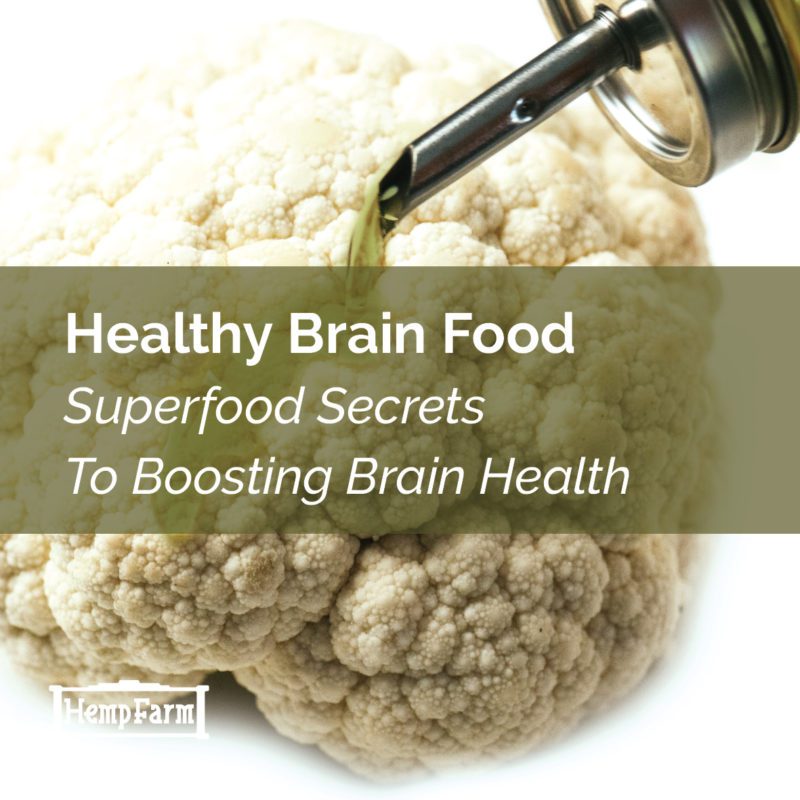Healthy Brain Food
Eat food. Not too much. Mostly plants. – Michael Pollan. If you already follow Pollan’s advice, you are well on your way to ensuring better brain health for yourself. Focusing on real food isn’t about any one prescriptive diet, it’s about variety, and eating food that our ancestors would recognise as food. The necessity of eating a diet rich in natural, whole foods while avoiding overly processed and packaged food has been well communicated for years now. It’s beneficial for our hearts, our muscles, and our bones… but have you ever considered your brain’s health in this way? Let’s briefly unwrap the science behind what your brain needs for it to work at its very best. In a nutshell, it’s pretty much this…
To properly improve your brain function, you need the whole range of minerals and vitamins every minute of every day!
Brain development requires many nutrients, and essential fatty acids in particular. Essential fatty acids (EFAs), omega-3, and omega-6 are all terms that refer to a group of compounds especially critical for building and ensuring the proper function of cell membranes. Humans can’t synthesize omega-3 fatty acids, which means the only way we can get them is through food or supplementation.
As recently as a decade ago, most people were unfamiliar with the term “omega-3s,” but now we’re more likely to know, at least, that they’re something good for us.
Given that most dietary advice focuses on carbohydrates, proteins and fats, many people might think that these are the only nutrients we need to eat. That’s only half the story, however. These are macronutrients and the focus on these is at the expense of much smaller but essential nutrients called micronutrients. Minerals and vitamins are sometimes called micronutrients because we require them in smaller quantities, hence the term, “trace minerals”.
- Vitamins are organic molecules, (meaning they contain carbon), and are very susceptible to heat – overcooking breaks them down.
- Minerals are stable chemical elements. They do not break down as easily as vitamins do. Plants absorb the minerals they find in the soil and use them to produce vitamins. Humans cannot do that, although if we have a healthy digestive system, some of those little organisms in our gut manufacture small amounts of vitamins for us.
While ultra-processed foods contain carbs, proteins, and fats, many lack essential micronutrients.
Nutrients are absolutely critical in at least five ways:
- to build your brain and enable to function efficiently
- to make energy molecules
- to modulate your DNA expression and keep your genes healthy
- to fight inflammation, and
- to protect you from toxins.
The list of nutrients known to contribute to brain function is summarised as:
- The same minerals needed by our soil to be healthy: Boron, calcium, chromium, copper, iodine, iron, lithium, magnesium, chromium, copper, iodine, iron, lithium, magnesium, manganese, molybdenum, phosphorus, potassium, selenium, vanadium, and zinc.
- All the vitamins produced by crops grown in soil: Vitamins A, B2 through 12, C, D, E, and K.
- The essential fatty acids: Particularly omega-3s
- All the phytonutrients that healthy plants package along with the above, currently estimated to be approximately 10,000.
- All the proteins and amino acids produced by healthy crops – there are about twenty-two amino acids.
So how much does hemp seed stack up?

Hemp seeds are high in brain-friendly antioxidants and omega fats, making them one of the greatest plant-based protein sources. Not to mention vitamin E, minerals, and resistant starch, a gut-friendly prebiotic. In a nutshell, these small seeds are nutrient-dense for the brain. Protein and fat are the two macronutrients found in hemp seeds that stand out. Let’s look at the incredible advantages that these two crucial players provide.
Hemp seed protein
Protein isn’t only for your muscles, it’s absolutely essential for brain development, function and mental health. So, what is it about hemp protein that distinguishes it from other proteins? Hemp seeds have a protein content of roughly 25%, which is exceptional. The protein in hemp seeds is very high quality because it contains significant amounts of all essential amino acids — the building blocks of protein. Some amino acids are considered “essential” because our bodies cannot make them, and we must get them from our food. While all plant foods contain amino acids, hemp seeds are one of the few plants that contain significant amounts of ALL the essential amino acids your body needs. This is something that very few plants can brag about!
Hemp seed fats
Like proteins, there are some “essential” fats that your body cannot produce and must be obtained from food. Omega-3 and omega-6 essential fatty acids, which are found in hemp seeds, are important for good health.
A typical “Western” diet is high in omega-6 fats. This throws off the body’s balanced ratio of omega-6s to omega-3s. This is why there are so many recommendations for consuming more omega-3 fats through food sources or supplements. In fact, studies reveal that omega-3 EPA appears to be the most significant nutrient for mental health disorders like depression and anxiety.
There is a lot of misinformation out there about omega-6s, but the key point to understand is the RATIO. Omega-3s and omega-6s are both necessary. That is why hemp seed fats are so unique! They have the ideal 3:1 ratio of omega-6 to omega-3 fatty acids.
Hemp seed minerals
We recently wrote a whole series on just a few of the many minerals found in hemp seed. Most notably and found in very high quantities are; Magnesium, Potassium, Iron, Zinc and Manganese.
The skinny
- Buy real food, avoid ultra-processed food.
- Increase the variety in your diet by adding new fruits, vegetables, nuts, and seeds that you perhaps haven’t tried before. Make sure your diet is fresh and colourful and get adventurous!
- Try a new and easy recipe every week
- Remember that dark, leafy greens are a great source of some of those B vitamins you need
- Meat, fish, and eggs are good sources of protein, helping to regulate blood sugar and appetite as well as providing bioavailable iron and zinc.
- If following a vegan diet, hemp is a valuable plant-based addition
There is no one-size-fits-all nutrient! For good brain health, all nutrients are necessary. Although other lifestyle elements such as exercise and a fulfilling emotional life are vital, it is critical to provide your brain with all the nutrients it requires for optimal metabolism.
The doctor of the future will no longer treat the human frame with drugs, but rather will cure and prevent disease with nutrition. – Thomas Edison
Sources: neurotrition.ca/blog/brain-food-essentials-hemp-seeds



